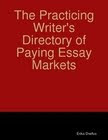Book Reviewing is NOT the Same as Sitting on the Couch Watching Bad TV
Earlier this week, Jason Boog reported on Arianna Huffington’s keynote speech at the “Tools of Change” conference. As I read the summary, I thought: Hey, Arianna! I’m with you! Especially when I read: “Huffington also explored the idea behind The Huffington Post books section, rejecting ‘this magical pub date’– the traditional time-period for scheduling book reviews and running book tours. ‘Forget about it–the idea that you have three weeks between pub date and oblivion. It doesn’t have to be like that,’ she said, earning a smattering of applause.” (A smattering of applause? I should think she would have received a standing ovation, at least from the writers and publishing professionals in the room.)
Anyway, as I say, I was with her–until I read this:
“Finally, she addressed the perennial criticism that many writers on the site don’t get paid. ‘Self expression is the new entertainment,’ she explained. ‘We never used to question why people sit on the couch for seven hours a day watching bad TV. Nobody ever asked, ‘Why are they doing that for free?’ We need to celebrate that moment rather than question it.'”
(Spoken like someone who might have both a huge divorce settlement AND a slew of advertisers and may not exactly depend on income generated by her own writing to pay her bills.)
Now, it may surprise some of you to learn that I’m just as capable of sitting on the couch for seven hours (when I have seven hours to spare) watching bad TV as the next person. (While I’m in confession mode, I may as well tell you that last weekend my sister and I went to see Kathy Griffin perform here New York. She–Kathy Griffin– was hilarious. There. By the way, if you don’t watch television, don’t bother going to see Kathy Griffin. Whenever she’s not imitating her mother, she’s talking about various reality shows and “characters. Or Anderson Cooper. Or Law and Order: Special Victims Unit.)
But I digress.
When I write, the “entertainment” factor differs significantly from what results when I stare at my TV. Any “entertainment” that comes from reviewing, for instance, is pure pleasure from the work, satisfaction from reading a book I (hopefully) want to tell others about (for that matter, reading it at least twice), thinking about that book, rechecking everything from the list price to the page count, and writing and crafting a text that will make sense and perhaps even resonate with readers. It’s work. It may be absorbing, self-expressive, and even entertaining work. But even if we choose not to be paid for it–as we might when writing for a particular cause/organization–it’s still work.
It’s not sitting on a couch watching bad TV.



